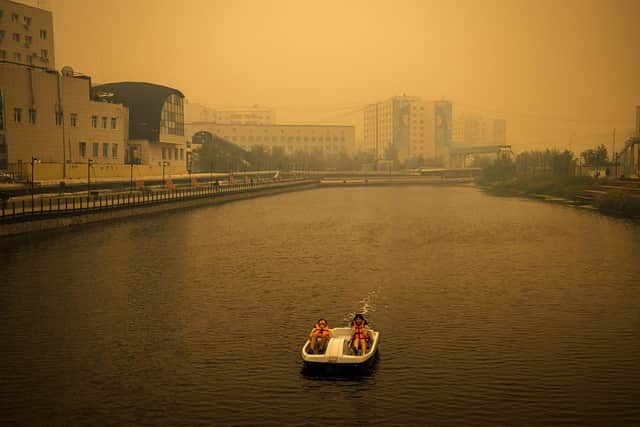Climate change's 'elephant in the room' is starting to breathe fire and we can no longer ignore it – Laura Waddell
Reading any of the many news reports that now appear daily about out-of-season flooding, wildfires, record-breaking heatwaves and sandstorms, it’s easy to forget that up until fairly recently, climate change was still framed as a niche topic in much media, offered up, when it did appear, to an audience segment seemingly pinpointed as the intersection between geography teachers and doomsday preachers.
That is, before its potential as a culture war topic was realised. It was in 2014 when a notorious BBC Radio 4 interview of Nigel Lawson about his climate change scepticism was widely criticised by scientists.
Advertisement
Hide AdAdvertisement
Hide AdLater, in 2018, still struggling to shake off the bad PR from this incident, an internal BBC editorial briefing was circulated which admitted they got climate change wrong too often, making the point “you do not need a denier to balance the debate”. Three weeks ago, after parent backlash, the BBC was forced to remove a page from its educational site Bitesize listing the ‘benefits’ of climate change. And now? Siberia is on fire.
In the middle of this period, during the Brexit debate, Michael Gove uttered his infamous line about people in this country having had enough of experts, a sentence revealing a cynical communications strategy, but also a neat summation of the bad faith anti-intellectualism that has led so much public discourse astray.
Who needs science when you can rile up the gullible? Why advance a topic of conversation when you can stall it infinitely, trapped in the back and forth of endless debate, exhausting everyone?
But I wonder – if apart from the mind-numbing frustrations of TV’s polarised-opinion format that has let down so many complex subjects over the last decade, where the content itself has mattered less than the meaty sound of two heads smacking together for our entertainment – whether a sense of lack of interest in other parts of the world, that foolish British sentiment of ‘it couldn’t happen here’, is the bigger factor behind all the feet-dragging.


By this point, when the climate change elephant in the room can no longer be ignored (because whenever it harrumphs, flames come out of its trunk), things seem to have sped up very quickly, very recently.
Disaster is getting closer to those of us so far fortunate enough to be able to put it out of our minds – just look at the pictures of flooding in Germany. But here we’re still in the phase where unseasonably high temperatures are announced on social media as scorchers, complete with sunglasses emojis, and the few voices who reply with “um, guys?” are ignored.
There can’t be much of an editorial tussle for regional reporting between wishing audiences pleasant weekends and being the voice of doom about sunny days.
After the year we’ve had, don’t we all enjoy a bit of life-affirming sunshine? But rather than planning for a hotter, wetter future, consider the degree to which we’re limited to short-term perspectives of what’s going on around us. All the while, that short term is getting shorter, the list of places predicted to be uninhabitable ever longer.
A message from the Editor:
Thank you for reading this article. We're more reliant on your support than ever as the shift in consumer habits brought about by coronavirus impacts our advertisers.
If you haven't already, please consider supporting our trusted, fact-checked journalism by taking out a digital subscription.
Comments
Want to join the conversation? Please or to comment on this article.
